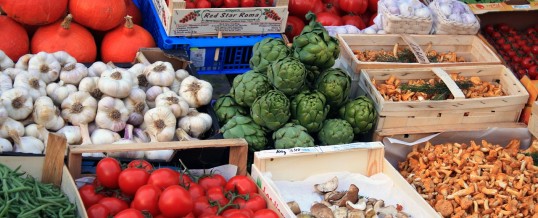
There is a lot of buzz these days about organic food, but what exactly does “organic” mean? Food that is certified organic must adhere to the USDA National Organic Program definition, which states:
“Organic food is produced by farmers who emphasize the use of renewable resources and the conservation of soil and water to enhance environmental quality for future generations. Organic meat, poultry, eggs, and dairy products come from animals that are given no antibiotics or growth hormones. Organic food is produced without using most conventional pesticides; fertilizers made with synthetic ingredients or sewage sludge; bioengineering; or ionizing radiation. Before a product can be labeled ‘organic,’ a Government-approved certifier inspects the farm where the food is grown to make sure the farmer is following all the rules necessary to meet USDA organic standards. Companies that handle or process organic food before it gets to your local supermarket or restaurant must be certified, too.”
While there are different certifiers for organic food, they all must follow the same guidelines set forth by the USDA in this definition. Similarly, food from outside the country that is certified organic must also adhere to the USDA standards.
Organic products fall into one of three categories. Products that are “100% Organic” contain, as you might imagine, 100% organic ingredients; foods labeled “Organic” contain at least 95% organic ingredients; while foods labeled “Made with Organic Ingredients” are made with a minimum of 70% organic ingredients and also contain restrictions on the remaining 30%, such as no GMOs. Products which contain less than 70% organic ingredients may list their organic ingredients on the side of their packaging but are not allowed to make any organic claims on the front of the package.
While there is much discussion, no conclusive evidence points to the fact that organic food is healthier than non-organic food, yet there are other things to consider when deciding whether you want to eat organic or not. For example, organic farmers do not use synthetic pesticides to protect their crops from insects or disease. Instead, they choose to rely on such methods as insect traps, planting disease-resistant varieties of crops, and using predator insects to control pests which might otherwise damage or destroy their crops. Also, organic foods are manufactured without many of the additives which are commonly found in non-organic food such as preservatives, artificial sweeteners, dyes and colorants, and flavorings. Some people choose organic products because they think they taste better, while others choose them because they appreciate that they are grown in a way which respects the environment.
Regardless of your reasons for choosing organic food, and whether you are a die-hard, long time consumer of organic food or just beginning the quest, greenestbeans.com can help. Join our community today and let us help you discover all the wonderful organic options that are available.
ShareNOV

About the Author: